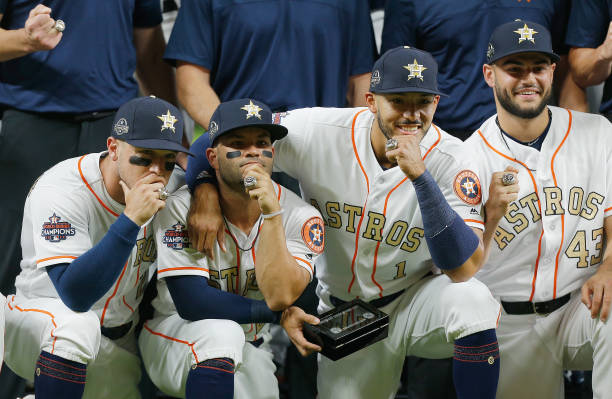
Getty
HOUSTON, TX – APRIL 03: Alex Bregman #2 of the Houston Astros,Jose Altuve #27,Carlos Correa #1 and Lance McCullers Jr. #43 show off the World Series rings at Minute Maid Park on April 3, 2018 in Houston, Texas. (Photo by Bob Levey/Getty Images)

Getty
HOUSTON, TX – APRIL 03: Alex Bregman #2 of the Houston Astros,Jose Altuve #27,Carlos Correa #1 and Lance McCullers Jr. #43 show off the World Series rings at Minute Maid Park on April 3, 2018 in Houston, Texas. (Photo by Bob Levey/Getty Images)
In a stunning display of modern fandom gone wrong, some baseball “supporters” have crossed every imaginable line, targeting not just a player’s performance but the safety of his family. When cheers turn to threats, the stakes skyrocket beyond the diamond. For one Houston Astros pitcher, the fallout from online abuse has turned into a full-time security concern, proving that in today’s game, the dugout isn’t the only place players need protection.
Watch What’s Trending Now!
When you start playing any sport, criticism is due. But when you take that up as a profession, the criticism goes to an unimaginable level. Everybody (well, mostly), including one who has never played the sport, will have an opinion for you. But even then, the criticism should have some boundaries. And when you cross that, it becomes more of a threat. That is exactly what has happened with Lance McCullers Jr.
A recent article by the Chicago Tribune talked about how not only McCullers Jr. but even his family were getting threats. They quoted him saying, “She asked me when I came home: ‘Daddy, like what is threats? Who wants to hurt us? Who wants to hurt me?’… So, those conversations are tough to deal with.” A player being criticized is ok, but threatening his family? Definitely, a strict no-no.
But where did it all start?
In just 0.1 innings against the Reds, McCullers gave up 7 earned runs on 6 hits. One rough outing, a 189.00 ERA snapshot, triggered outrage so vile it spilled into death threats. After the threats surfaced, the Astros pitcher didn’t hesitate—he hired 24-hour security for his family.
His five-year-old daughter asking who wants to hurt her is a question no child should ever voice. The team immediately contacted MLB security and Houston police, launching an ongoing investigation. What began as online bile quickly escalated into real-world fear and protective action.

MLB and the Astros boosted efforts to track down anonymous trolls, deploying cyber analysts and adding security. Police officers now stand in the family section during games, both home and away. While grateful, the pitcher had a clear message for fans: Want us to succeed—but not at our kids’ expense. “People should want us to succeed. We want to succeed, but it shouldn’t come at a cost to our families, the kids in our life.”
When the box score starts dictating who deserves safety, we’ve clearly lost the plot. No ERA, blown save, or bad inning justifies scaring off a child. If your fantasy league rage leads to real-life threats, maybe you’re the one who needs benching. Passion is welcome in baseball—delusion, not so much. Let’s remember: Fans are meant to support the game, not weaponize it.
But this was not a single instance…
Alex Cora talks about the online threats he received after his time with the Astros
Baseball’s moral police were out in full force—keyboards blazing, judgment locked and loaded. Never mind that the Houston Astros weren’t the only ones peeking at pitches; they were just the best at getting caught. While the public demanded heads, one man became their favorite effigy. The pitchforks didn’t stop at suspensions—they followed him home. And Alex Cora? He remembers exactly how ugly it got.
In 2017, the Houston Astros orchestrated a sign-stealing scheme that shocked baseball fans worldwide. Alex Cora, then the Astros’ bench coach, found himself at the center of a storm. When the scandal broke (during his 1st Red Sox tenure), it wasn’t just a hit to his career—it ignited fierce public outrage. The fallout led to his suspension and eventual departure from the Red Sox before 2020.
The criticism was relentless, fueled by a sense of betrayal from fans and media alike. Cora’s involvement placed him under an unforgiving spotlight, and the backlash went far beyond words. “I put my family in a tough spot, especially when the news came out. It was dangerous, and we were afraid, to be honest,” he admitted. The online threats escalated to a point where personal safety became a real concern.
After the suspension, Cora reached out to MLB’s security team for protection. “I don’t want to go into details, but they did an amazing job,” he shared, acknowledging their support during those tense times.
And despite the fear and criticism, he returned to managing, determined to rebuild trust while shielding his loved ones from harm. Alex Cora’s journey through scandal and scrutiny proves that, in baseball, the real game sometimes happens off the field. When the online mobs come calling, even the toughest managers need a security detail—and maybe a thicker skin.
Now, as the dust settles, one thing’s clear: In the age of digital pitchforks, survival requires more than just talent—it demands resilience, resolve, and a solid Wi-Fi filter.

